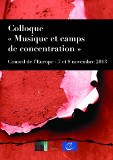4th ministerial seminar "Teaching remembrance - for a Europe of freedom and rule of law"
Nuremberg and Dachau (Germany), 5-7 November 2008

Organised within the framework of the Council of Europe "Day of Remembrance of the Holocaust and Prevention of Crimes against Humanity", and on the eve of the 70th anniversary of the "Reichskristallnacht", the seminar was attended by Education Ministers, senior officials and experts from the 49 states of the European Cultural Convention.
Eyewitness accounts by two survivors, a presentation on "The Righteous among the Nations", a lecture on "The significance of the Nuremberg trials" and general discussions on the theme of "Towards a European citizens’ ethos" were among the highlights of the seminar. Historic sites were used for these events, including the Nazi Party Rally Grounds (Reichsparteitagsgelände), the Dachau concentration camp memorial and the Nuremberg court room (see programme).
The many delegations present were introduced to the legal dimension of crimes against humanity and were alerted to the importance of the Holocaust in the implementation of an international justice system and the institutionalisation of human rights protection following the Nuremberg trials.
The establishment of a democratic Europe founded on the rule of law and mutual respect for diversity had been a first step in the aftermath of the Holocaust. Since 1945, the states of Europe had been striving, through preventive action and education, to preserve and defend what had been achieved in order to avoid a repetition of exclusion processes.
An overview of Holocaust teaching in the various member states revealed a wide range of national initiatives not only as regards compulsory school curricula but also in terms of ad hoc actions, competitions, study trips to authentic memorial sites, “dedicated days”, exhibitions and meetings with survivors. The vast majority of countries now use teaching of the Holocaust as a paradigm for teaching about all crimes against humanity, with particular emphasis on the mechanisms involved. All countries, however, are aware of the need to establish this subject firmly within the curriculum before the last survivors die, to ensure the transition from memory to history.
- Programme
- Video message from Terry Davis, Secretary General of the Council of Europe (in French only)
- Speech by Guido Bellatti Ceccoli, Ambassador, Permanent representative of San Marino, Representative of the Committee of Ministers of the Council of Europe (in French only)
- Speech by Annegret Kramp-Karrenbauer, Minister, President of the Standing Conference of the Ministers of Education and Cultural Affairs of the Länder of the Federal Republic of Germany (in German only)
- “The significance of the Nuremberg trials”. Address by Prof. Dr Christoph Safferling, Universität Marburg (in German only)
- Address by Mr Wladyslaw Bartoszewski, Secretary of State and Plenipotentiary of the Prime Minister for International Dialogue, Poland (in German only)
- Closing speech by Mr Gabriele Mazza, Director of Education and Languages of the Council of Europe
- Conclusions of the 4th ministerial seminar "Teaching remembrance - for a Europe of freedom and rule of law" (in French only)

Actes du Colloque
« Musique et camps de concentration » Conseil de l’Europe - 7 et 8 novembre 2013

Editor: Amaury Du Closel
2015
French only


